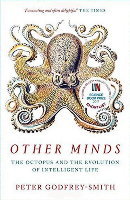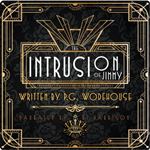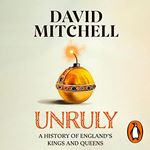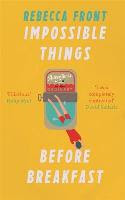The Hearing Trumpet
by Leonora Carrington
narrated by Siân Phillips
"An apocalyptic fairy tale quest about an occult old ladies' home and the spry nonagenarian who ends up there. After coming into possession of a hearing trumpet, 92-year-old Marian Leatherby discovers her son's plans to send her to a nursing home."This was a wild ride! The first half is a bit like the Cinderella story but about a 92-year-old woman being mistreated by her younger family. The middle section is about her time in the craziest nursing home you'll ever find, and then it goes completely off the rails when she survives a global apocalypse and another woman marries a wolf. It's books like this that I was hoping for with the Classics list I've been using, but they don't often materialise.
Other Minds: The Octopus and the Evolution of Intelligent Life
by Peter Godfrey-Smith
"In captivity, octopuses have been known to identify individual human keepers, raid neighbouring tanks for food, turn off lightbulbs by spouting jets of water, plug drains, and make daring escapes. How is it that a creature with such gifts evolved through an evolutionary lineage so radically distant from our own?"The most interesting things that I didn't know before are that the lifespan of most octopus species is only one or two years, and about the mechanism for displaying a whole spectrum of skin colours despite octopuses having little or no colour perception. Having said that, the book wasn't quite as good as I was expecting, given that octopuses are really amazing creatures and the author has studied them a lot. It has some colour pictures in the middle! but they aren't all that exciting. Given the title, perhaps I should have expected to read about the rather academic description of the evolution of the nervous system rather than all the wondrous things that octopuses have been seen to do.
The Intrusion of Jimmy
by P. G. Wodehouse
narrated by B. J. Harrison
"Having fallen in love on a transatlantic liner, Jimmy Pitt befriends a small-time burglar and breaks into a police captain's house as a result of a bet. The cast of characters head to England and the stately Dreever Castle, overflowing with impostors, detectives, crooks, scheming lovers and conniving aunts."This is a standalone Wodehouse story written before Jeeves and Wooster were conceived, and I would say is actually better in that it relies less on the contrived coincidences and asinine character of that series of stories. I could almost say that it is more plausible, but that would be ridiculous as it is not plausible at all, it just feels like that. I enjoyed it.
Unruly: The Ridiculous History of England's Kings and Queens
by David Mitchell
narrated by the Author
"England's monarchs, while acting as feared rulers firmly guiding their subjects' destinies, were in reality a bunch of lucky sods who were mostly as silly and weird in real life as they appear today in their portraits. Taking us right back to King Arthur (spoiler: he didn't exist), David tells the founding story of post-Roman England right up to the reign of Elizabeth I (spoiler: she dies)."Given that David Mitchell is one of my favourite comedians, I would have been very disappointed had I not enjoyed this, with the extra bonus that he narrates it too. And it was free with my Spotify subscriptions, and I could even download it to listen in the car. And it was a right good listen too.

Les Misérables
by Victor Hugo
translated by Isabel F. Hapgood
"Set in the Parisian underworld, Les Misérables follows Jean Valjean, originally an honest peasant, who has been imprisoned for 19 years for stealing a loaf of bread to feed his sister's starving family. A hardened criminal upon his release, he eventually reforms, becoming a successful industrialist and town mayor. Despite this, he is haunted by an impulsive former crime and is pursued relentlessly by the police inspector Javert."This is a ridiculous book, not least because it has more than 1300 pages. The story itself probably occupies less than half of these pages, and the rest includes (among other digressions) long sections describing the Battle of Waterloo, the history of a pub, (French) slang, and the Paris sewers - how and when they were built and what form they take, following which Parisian roads. But I kept ploughing through, helped by the fact that I was on retreat for the second half so had lots of unallocated time. I got it from the library, and had to renew it so many times that I ran out of online options and had to physically take it back to the library, return it and borrow it again. If you're interested then read an abridged version (and I can't imagine that I've ever recommended doing that before), or even better, take in the musical which is pretty true to the story and vastly more entertaining.
Hare House
by Sally Hinchliffe
"In the first brisk days of autumn, a woman arrives in Scotland. Moving into a cottage on the remote estate of Hare House, she begins to explore her new home – a patchwork of hills, moorland and forest. But among the tiny roads, dykes and scattered houses, something more sinister lurks: local tales of witchcraft, clay figures and young men sent mad."I saw this in the library as I was re-borrowing Les Mis, and it's written by someone whose blog I regularly read. I really enjoyed her writing and the well-rounded characters she introduced, but something about the ending weakened it. I found myself musing on how I might have changed the plot entirely to make it hang together better.
Inconceivable Emancipation: Themes from the Vimalakirti-Nirdesa
by Sangharakshita
"Mahayana Buddhism emphasizes the ideal of the Bodhisattva, one who seeks to become Enlightened out of a compassionate desire to help all living beings. In the Vimalakirti-Nirdesa we meet the Bodhisattva Vimalakirti, a worker of wonders, a formidable debator and skilful teacher.""Next term is going to be a bit challenging," our teacher said. Mahayana Buddhism is a bit flowery, metaphorical, paradoxical, stretching the limits of reality with one hundred thousand million worlds and a parasol big enough to encompass all of them. So I was duly warned, and picked up the textbook with some apprehension, but in fact it reminded me of a popular science book I'd read on the topic of (mathematical) infinity. I didn't quite understand the text, but was fairly certain that just beyond the scope of my imagination there was probably quite a satisfying truth. We start the class that relates to the book next week, so maybe I'll change my mind when that happens.
Impossible Things Before Breakfast
by Rebecca Front
"A collection of true stories about surprising turns of events, bizarre misunderstandings and improbable life lessons. We learn, among other things, how gazing at the stars can help you communicate with teenagers, how a mushroom can undermine an ancient ritual, and why everyone should wear a cape."This is another book I happened to see at the library while I was looking for something else, and one of the reasons that I picked it up is because for a few weeks, Rebecca was in my class at secondary school, before she had some kind of crisis and switched to a different school. Every time I see or hear her on TV or radio I think, "She was in my class," and reflect on how well she has done, and what a nice person she seems to be, and try not to compare her career trajectory with mine. Not that I could ever have become an actor and writer, and she is rather good at both of these - her book is great, by the way, and by the way, did you know she was in my class at school? Briefly, anyway.







No comments:
Post a Comment